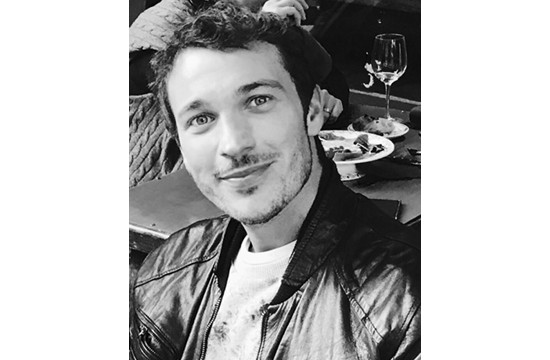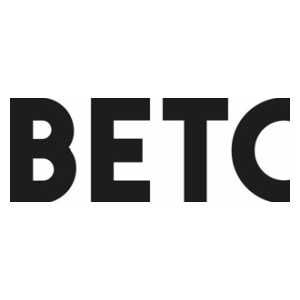
5 Minutes with… David Martin Angelus

If there’s one thing that sets David Martin Angelus apart from his fellow creative directors, it’s something he likes to call “duality”. His father was a ‘suit’ with a big job in big business, keen for his son to pursue a safe career path, while his mother was a free-spirited English teacher that was open to David doing whatever made him happy - both sides have rubbed off on him as a creative and led to an interesting path to adland. He’s worked in marketing at the likes of Nissan, dabbled in a spot of production, but found his true calling in agency creative departments, offering him 360 knowledge of the needs of his clients.
Nowadays he’s at BETC in Paris and has recently overseen the launch of Schweppes’ new tagline - a nifty, simple switch from ‘What Did You Expect?’ to ‘What Do You Expect?’, leaving an alluring cliffhanger.
LBB’s Addison Capper tracked down David to pick his brains.
LBB> You are half American and half Spanish - where did you grow up and what kind of kid were you?
DMA> Yeah, my mom is from New York City and my dad is from Madrid. They met on the train from Madrid to Barcelona and stayed, so I was born in Barcelona and attended an American international school which gave me a perspective on both worlds. Spain at that time was a great place to grow up. Things were taking off and it was becoming a hub of creativity but I used to spend my summers in the US with my family.
What kind of kid was I? Well let’s just say I wasn’t the easiest kid to handle. I was curious, active and full of energy. I drove my parents and teachers crazy. I loved playing pranks, playing outdoors and watching movies. My dream was to write and make films. At that time everything seemed possible. My parents still laugh when they remember the time they asked me what I wanted to be when I grew up, and I answered: “incredible”. I guess that gives you an idea of the kind of kid I was growing up!
LBB> Your dad was more a ‘suit & tie’ type of guy, whereas your mother was more free-spirited. Can you elaborate on that a bit more and how it has shaped the person you are today?
DMA> Well that’s a tough one. Hehe I hope they won’t read this. My dad was a ‘suit’ with a big job. He wanted my brother and me to follow a safe career path. So even though I loved film, I started studying business. That was short-lived as I decided to put up a fight and change my major to communications. But I did learn a lot from him. He showed me the value of hard work and organisation. I discovered that the business skills he taught me were extremely useful even in the creative world - especially when you need to manage clients yourself.
My mom was the complete opposite. She was an English teacher and she loved books, movies, music and art and encouraged me to do whatever made me happy. Looking back now, it was a good balance and it helped me develop both sides of the brain.
LBB> What do you remember about your early thoughts on advertising? Were you interested from an early age?
DMA> As I mentioned before, film was my passion growing up. I loved telling stories and always had so many ideas in my head. This doesn’t mean I didn’t like advertising. I still can sing all the jingles that were big in the ‘80s when I was growing up. But it wasn’t until later on that I realised an actual business could quench my thirst for creativity. I always thought I had to pursue art in its purest form.
LBB> Before becoming a creative you worked both in production and on the client side - how do those experiences inform your approach to creativity? Do you still draw on them?
DMA> Absolutely. I think that having a 360 point of view of the business with experience in production, the client side and creativity is what has helped me do good work. We can’t forget that advertising IS a business and that you need to know how to sell and deliver results. This doesn’t mean that the work needs to be uninspiring and boring. There is always a great idea to be found that is both creative and can deliver the results a client needs. The important thing is to listen to the client. I find that a lot gets lost on the way between the client and creatives. Personally, I like to know exactly what my clients’ thoughts are before working on a brief. After that, knowing how production works helps you understand how to make your ideas come to life the way you want them to.
LBB> How did you end up becoming a creative after that? Was it something you’d always wanted to do or more a case of coincidence? I’ve heard that it was “always your calling”…
DMA> For me it was more of a coincidence. After finishing college I was deciding what to specialise in. To move to the US to study film or find something else to do. Meanwhile I got a job at Nissan working in the marketing department. It was there that I rediscovered advertising. I had weekly meetings with TBWA to see the new advertising campaigns they were working on. I remember thinking, “wow, that’s cool. I can do that!” Something clicked inside my head and that’s when I decided to shift into advertising. I got an internship at Y&R and after that I decided to do my masters in copywriting at Miami Ad School.
LBB> You’ve lived in New York, Miami, Chicago, London, Paris and Barcelona - how does that global experience inform your work as a creative?
DMA> I think that having a global perspective has helped me come up with work that has a universal insight. Whenever I come up with an idea I think to myself: would this campaign work in Spain? In the US? In France? It’s kind of a torture test. After all, great ideas always travel when they are based on universal truths. No matter how local they are.
LBB> After those experiences, how do you find working in the French market? Do you feel that the local advertising market is healthy and creative?
DMA> I’ve been working in the French market for five years now and, honestly, the reason I’ve stayed this long is because I find the local advertising market extremely rich and creative. I’ve noticed that in some countries the work for award shows is great but the day-to-day work is not that interesting. I find that in France the average work on TV is also pretty good. But I still think there’s room for improvement - especially when it comes to the big brands. Brands need to start thinking of advertising in a broader sense. They need to take more chances with branded entertainment and non-traditional digital. I think that the US has led the way when it comes to this, thanks to work from agencies like Droga, BBDO, Goodby and Wieden. Hopefully France’s big clients will be inspired and surprise us in the near future.
LBB> You speak five languages - I’m intrigued to know which ones and why? Is learning languages something you enjoy doing or more a necessity of living in various places around the world?
DMA> I speak three languages natively (English, Spanish and Catalan) but I also studied German when I was younger. It’s probably a bit rusty by now but I’m sure if I practice it enough it would come back. I didn’t speak French before moving to Paris, but I feel that the only way you can really integrate into a country’s culture and customs is by learning the local language. I also find it refreshing to use my brain for something that isn’t just coming up with ideas! Learning a language exercises a completely different part of the brain. There are rules to learning a language. When it comes to creative ideas everything is possible.
LBB> What do you like to get up to outside of work? Any quirks or hobbies that keep you inspired?
DMA> When I’m not working I love to travel. I’m a true globetrotter. I think I’ve been to almost 60 countries already. I love the feeling of culture shock. Going somewhere different, learning new customs and eating different food. I’m really addicted to how beautiful our world is. I think nothing feeds creativity more than being in touch with what’s around you. So every time I have time off, I hop on a plane, train or car and head off somewhere new. Besides that, I love food, movies and books. I think all of these things make you travel in one way or another.
LBB> Which pieces of work that you’ve been involved with recently have you been particularly proud of and why?
DMA> I’m extremely proud of the past few campaigns I’ve produced with BETC. ‘Unsilenced’ was a very special project that encouraged people to learn sign language in a very unique way. It’s the first original song that’s sung through sign language and dance. People thought they were watching an instrumental music video for an electro pop song, but at the end of the music video, they discovered that the dancer was actually singing the whole time by mixing sign language and dance. Then, on Unsilenced.fr people could uncover the lyrics hidden in the song. Lyrics that spoke to the isolation the deaf community feels when nobody speaks their language.
I’m also particularly proud of the Schweppes campaign I just produced. It was my first pitch with the agency and I loved that by just changing the tagline from “What did you expect?” to “What do you expect?” we were able to expand the creative possibilities of such an iconic brand.
LBB> Who are your creative heroes and why?
DMA> I could give you a long list of names of people whose work I admire, but the truth is that I’ve never really idolised people. I prefer to celebrate the creatives nobody talks about. The creatives who never give up and push clients everyday to do better work; the creatives who fight to make this business more inclusive in every way. Today, those are my creative heroes.













